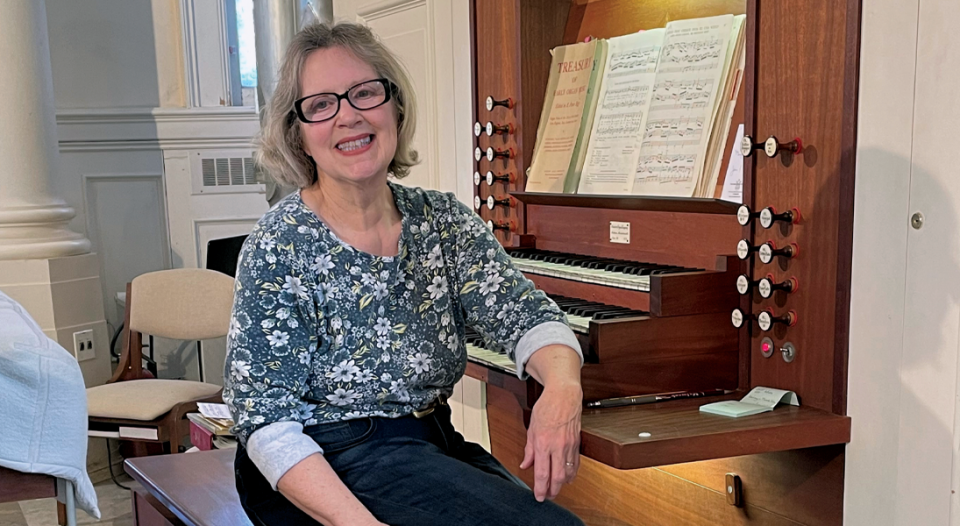Cathy Elkiss unlocks the door to the Church of the Abiding Presence in Gettysburg, Pa., removes the cover from one of two organs and arranges her music on the stand. As music director for worship life at United Lutheran Seminary (ULS), she is not preparing to play for in-person worship.
Instead, Elkiss is getting ready to record music for a streamed Wednesday chapel worship, presented each week by ULS faculty on the seminary’s YouTube channel. (Tuesday and Thursday worship are presented by students.)
The pews are empty except for a lone recording engineer who, along with Elkiss and one singer, is masked and socially distanced over the next hour.
Pandemic changes liturgy
Music is intrinsically linked to the Lutheran liturgy. As the ELCA resource “What Is the Role of Music in the Lutheran Liturgy?” explains: “Luther regarded music first and foremost as gift, one of the principles of music listed in Principles for Worship: ‘God creates music as part of the whole creation and gives it to humankind to develop and shape.’”
Luther himself was a musician and composer who penned the iconic hymn “Ein Feste Burg Ist Unser Gott” (“A Mighty Fortress Is Our God”).
Before the pandemic, church musicians had the ability to develop and shape the role of music in weekly worship, but in spring 2020 the person-to-person interaction so crucial to musical performance, and worship itself, disappeared overnight.
While the seminary was well-positioned for remote teaching and learning before the pandemic, applying the same technology and approach to worship life on two campuses more than 200 miles apart, including a robust distance-learning community, was uncharted territory.
In Philadelphia, Charles Leonard, ULS dean of worship life, knew of Elkiss’ role as organist and choir director in Gettysburg. At the time, the Philadelphia campus didn’t have a permanent music director, so students there would rotate serving as instrumentalists and singers.
While the seminary was well-positioned for remote teaching and learning before the pandemic, applying the same technology and approach to worship life on two campuses more than 200 miles apart, including a robust distance-learning community, was uncharted territory.
Given the distance, Elkiss said she and the worship life team “had to get to know each other” during initial discussions on how she could fill the role of music director for the campuses. “The question was not only how do we bridge the geographical gap between the two campuses regarding worship music during the pandemic, but the cultural gap as well,” she added.
One would never know that Elkiss had previously played exclusively in the Gettysburg chapel for Wednesday worship, in addition to other ULS projects, because transitioning to her new role as music director was seamless.
Growing up, Elkiss wanted to be a church musician. Her grandmother was a devout Lutheran and, while attending church with her as a young girl, Elkiss knew she “wanted to be the one playing the organ and directing the choir.”
She studied piano at University of Maryland, Baltimore County, and went on to earn a master’s degree and a doctorate in music from the school’s flagship campus in College Park. She has been a working musician since age 17 and is also organist and choirmaster at Memorial (Episcopal) Church of the Prince of Peace in Gettysburg.
Becoming united
The collaboration between Elkiss and ULS worship team was a natural evolution. “There was never a discussion of not having music,” she said. “I feel as though some walls came down when we collaborated on how to program and present music for Wednesday chapel worship in a way that wasn’t defined by a physical space.”
Music is so easily accessible these days. One can grab it off almost any digital platform, and virtual choirs and orchestras, for which musicians record their parts on cellphones, have become commonplace. Yet they are unnatural. “None of us thought the pandemic would go on this long,” Elkiss said. “Music in the Lutheran church is not a solitary venture. It’s one of the many ways we become united through our faith.”
It’s hard to imagine what worship and musical performances will look like when COVID-19 is no longer part of our daily lexicon. Yet, as Elkiss notes, “music and Lutheranism belong together. It’s our job to be sure music doesn’t get lost, so seminary students can continue the legacy of these traditions and can carry them forward to their own congregations in the future.”
To hear Cathy Elkiss play United Lutheran Seminary’s Andover organ and positive organs and demonstrate its Zimbelstern stop, visit YouTube.com/unitedlutheranseminary.




